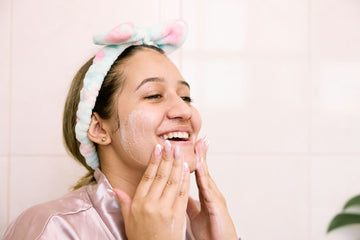Understanding Skin Care Fundamentals
Healthy skin is the foundation of a radiant complexion, and it starts from the inside out. A balanced diet rich in fruits, vegetables, and whole grains is essential for maintaining healthy skin. Proper hydration is also crucial for flushing out toxins and keeping skin looking plump and firm.
A consistent skin care routine can help prevent skin concerns such as breakouts, dehydration, and premature aging. Understanding your skin type and skin condition is crucial in choosing the right products and treatments for your skin.
Incorporating expert skin care tips can further enhance your regimen, ensuring vibrant and flawless-looking skin.
What is Healthy Skin?
Healthy skin is a reflection of overall well-being and is characterized by a smooth, radiant, and even-toned complexion. Achieving healthy skin involves a combination of proper skincare habits, a balanced diet, regular exercise, and adequate sleep.
When your skin is healthy, it is better equipped to protect itself from environmental stressors such as pollution and UV radiation. This resilience helps prevent common skin concerns like acne, dryness, and premature aging.
By focusing on holistic wellness, you can maintain healthy skin that looks and feels its best.

Healthy Skin Starts from the Inside
Eating a diet rich in antioxidants and omega-3 fatty acids can help reduce inflammation and promote healthy skin cell production. Drinking plenty of water throughout the day can help keep skin hydrated and plump.
Exercise can help improve circulation and boost collagen production, leading to more youthful skin. Getting enough sleep is essential for allowing skin to repair and regenerate itself. Managing stress can help reduce inflammation and promote healthy skin.
Staying Hydrated for Healthy Skin
Drinking plenty of water is essential for maintaining healthy skin. Dehydrated skin can appear dull, tight, and flaky, making it more susceptible to wrinkles and fine lines. To keep your skin hydrated, aim to drink at least 8-10 glasses of water per day.
Incorporating hydrating foods like watermelon, cucumbers, and celery into your diet can also help boost your skin’s moisture levels. Additionally, using a hydrating serum or moisturizer can lock in moisture and support overall skin health, ensuring your complexion remains plump and radiant.
Eating for Healthy Skin
A balanced diet rich in whole foods, fruits, vegetables, and lean proteins is crucial for maintaining healthy skin. Foods high in antioxidants, such as berries, leafy greens, and nuts, help protect the skin from environmental stressors and promote collagen production.
Omega-3 fatty acids found in fatty fish, flaxseeds, and walnuts can reduce inflammation and support healthy skin cell production. On the other hand, processed and sugary foods can lead to inflammation and exacerbate skin concerns.
By nourishing your body with the right nutrients, you can achieve and maintain a glowing complexion.

Creating a Personalized Skincare Routine
A personalized skincare routine can help address specific skin concerns and skin types. This includes combination skin, which affects the t-zone with excess oil while remaining balanced in other areas, requiring specific product management.
Knowing your skin type and concerns is crucial in choosing the right products and treatments for your skin. A consistent skincare routine can help prevent skin concerns such as breakouts, dehydration, and premature aging.
A skincare routine should include a combination of products that work together to achieve healthy, glowing skin.
A professional esthetician can help you create a customized skincare routine tailored to your skin type and skin condition.
Know Your Skin Type and Concerns
Understanding your skin type (normal, dry, oily, combination, sensitive) is essential in choosing the right products and treatments for your skin. Identifying your skin concerns (acne, hyperpigmentation, fine lines, dehydration) can help you choose the right products and treatments to address them.
For instance, dry skin requires specific nurturing and oil-based products, while sensitive skin needs tailored care to manage conditions like dryness and irritation. A skincare routine should be tailored to your individual skin type and skin condition.
A professional esthetician can help you determine your skin type and skin condition.
Essential Skin Care Steps
Cleansing is the first step in any skincare routine, and it’s essential for removing dirt, oil, and makeup from the skin. Exfoliating helps remove dead skin cells and promote cell turnover, leading to brighter, smoother skin.
Toning helps balance the skin’s pH and prepare it for further product application. Moisturizing is essential for hydrating and protecting the skin.
Cleanse and Exfoliate
Use a gentle cleanser that suits your skin type to remove dirt, oil, and makeup from the skin. Exfoliate 1-3 times per week to remove dead skin cells and promote cell turnover. Use a physical or chemical exfoliant, depending on your skin type and concerns. Be gentle when exfoliating, as over-exfoliating can lead to irritation and dryness.
Advanced Skin Care Techniques
Stimulating blood flow can help improve skin texture and promote collagen production. Improving skin texture can help reduce the appearance of fine lines and wrinkles. Using skincare ingredients that promote collagen production can help improve skin elasticity and firmness.
A professional esthetician can help you choose the right products and treatments to address your skin concerns.
Using Targeted Serums
Targeted serums can be a game-changer in addressing specific skin concerns and promoting healthy skin. Look for serums containing active ingredients like retinol, vitamin C, and hyaluronic acid. Retinol helps stimulate collagen production, vitamin C brightens the complexion, and hyaluronic acid locks in moisture.
Choose a serum formulated for your skin type and concerns, and apply it after cleansing and toning to ensure it penetrates deeply into the skin. Incorporating targeted serums into your skincare routine can help you achieve a more youthful and radiant complexion.
Stimulate Blood Flow and Improve Skin Texture
Use a facial massager or roller to stimulate blood flow and improve skin texture. Try facial yoga or acupressure to stimulate blood flow and promote collagen production. Use skincare ingredients that promote collagen production, such as retinol or peptides. Exfoliate regularly to remove dead skin cells and promote cell turnover.
Protecting Your Skin from the Sun
Protecting your skin from the sun is essential for preventing premature aging and skin cancer. Using a broad-spectrum sunscreen with at least SPF 30 can help protect the skin from UVA and UVB rays. Applying sunscreen regularly can help prevent skin concerns such as premature aging and skin cancer. A professional esthetician can help you choose the right sunscreen for your skin.
Shield Your Skin from Premature Aging
Use a broad-spectrum sunscreen with at least SPF 30 to protect the skin from UVA and UVB rays. Apply sunscreen regularly, even on cloudy days and in the winter. Use a physical sunscreen that contains zinc oxide or titanium dioxide for optimal protection. Avoid using chemical sunscreens that can irritate the skin.
Adjust Your Routine as You Age
As you age, your skin’s needs and concerns change. A professional esthetician can help you adjust your skincare routine to address your changing skin concerns. Use skincare ingredients that promote collagen production and improve skin elasticity. Exfoliate regularly to remove dead skin cells and promote cell turnover.
Client Education and Referral
Educating clients on proper skin care can help them achieve healthy, glowing skin. A professional esthetician can help clients choose the right products and treatments for their skin. Referring clients to a professional esthetician can help them achieve healthy, glowing skin. A professional esthetician can help clients prevent skin concerns such as breakouts, dehydration, and premature aging.
Educate Your Clients on Proper Skin Care
Educate clients on the importance of proper skin care and how it can help them achieve healthy, glowing skin. Teach clients how to use skincare products correctly and how to create a consistent skincare routine.
Encourage clients to schedule regular facials and consultations to achieve healthy, glowing skin. Refer clients to a professional esthetician for customized skincare advice and guidance.
Achieving Radiant Skin through Effective Skin Care
Use a combination of skincare products as part of a consistent skin care routine to achieve healthy, glowing skin. Exfoliate regularly to remove dead skin cells and promote cell turnover. Use skincare ingredients that promote collagen production and improve skin elasticity.
Protect your skin from the sun by using a broad-spectrum sunscreen with at least SPF 30.
Maintaining Healthy Skin
Maintaining healthy skin requires a consistent skincare routine, a balanced diet, and a healthy lifestyle. By following these tips and using targeted skincare products, you can promote healthy skin and address specific skin concerns.
Remember to cleanse, exfoliate, tone, and moisturize regularly, and protect your skin from the sun. A holistic approach to skincare will help you achieve and maintain a glowing complexion.
Getting Enough Sleep for Skin Care
Getting enough sleep is essential for maintaining healthy skin. During sleep, the skin repairs and regenerates itself, producing collagen and elastin to improve skin elasticity and firmness. Aim for 7-9 hours of sleep per night and establish a consistent sleep routine to regulate your skin’s natural repair process.
Additionally, using a sleep mask or eye cream can help reduce puffiness and dark circles, promoting a more rested and radiant complexion. Prioritizing sleep is a simple yet effective way to support your skin’s health and appearance.
Frequently Asked Questions
What is a good tip for an esthetician?
A good tip for an esthetician is to always educate clients on their skin type and how to properly care for it. Offering customized skincare routines and addressing specific skin concerns will help clients achieve the best results.
How to be a successful esthetician?
To be a successful esthetician, focus on client education, provide personalized treatments, and stay updated with the latest skincare techniques and products. Building trust with clients through expertise and genuine care will ensure long-term success.
How much do estheticians make in tips?
Estheticians can make an additional 10-20% of their service cost in tips, depending on the quality of service provided and the clientele. Exceptional service and client satisfaction often result in higher gratuities.
How much should I tip for a $50 facial?
A standard tip for a $50 facial is 15-20%, which would be $7.50 to $10. If you receive exceptional service, tipping on the higher end is a great way to show appreciation.
Top Beauty Health Tips for Radiant Skin and Overall Wellness Conclusion
Achieving radiant skin starts with a personalized skincare routine, proper nutrition, and professional guidance.
By following essential esthetician tips, you can maintain a healthy, glowing complexion while preventing common skin concerns.
Whether you are a skincare professional or someone looking to enhance their beauty regimen, focusing on consistency, protection, and education will ensure long-term skin success.






